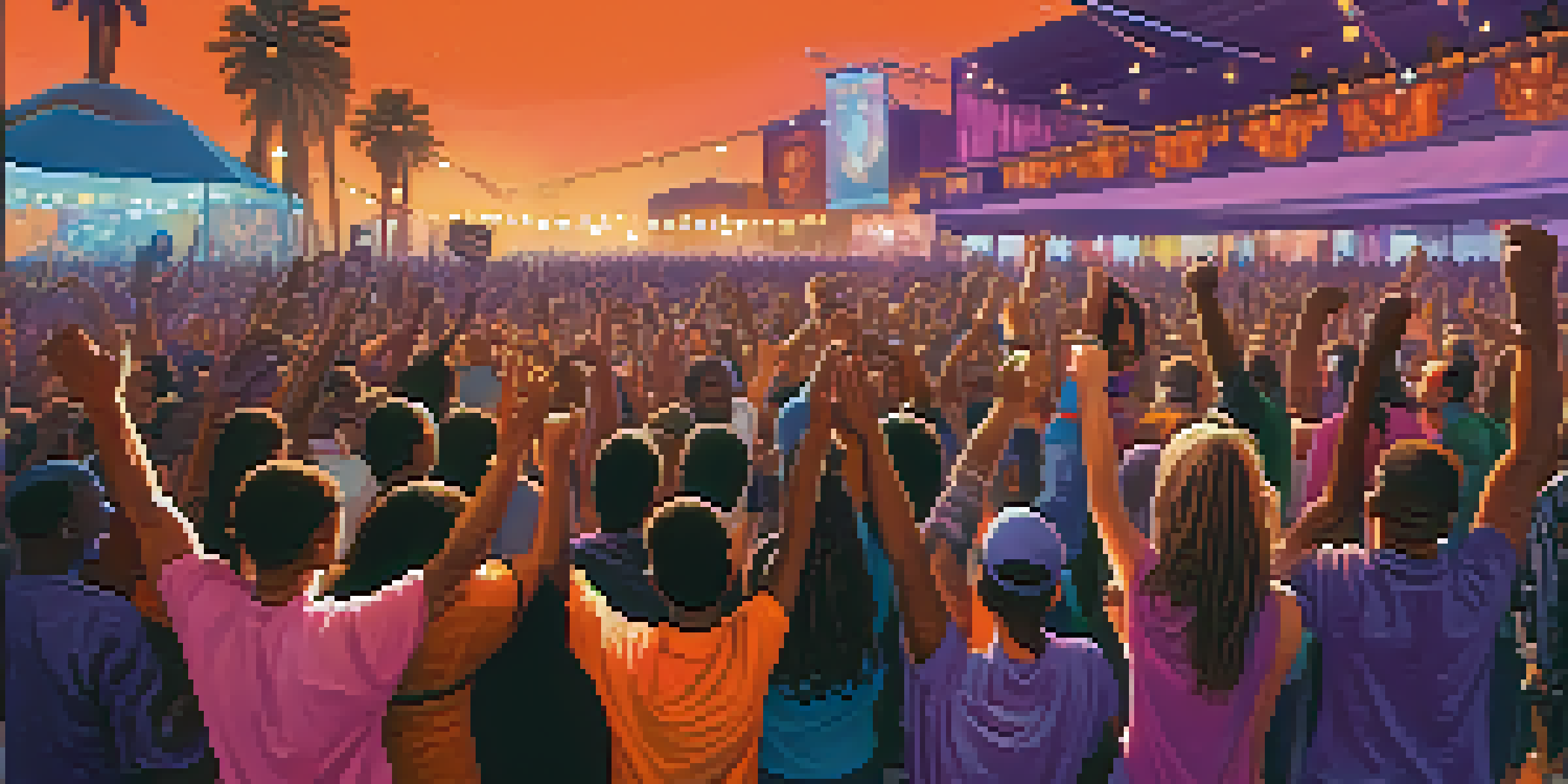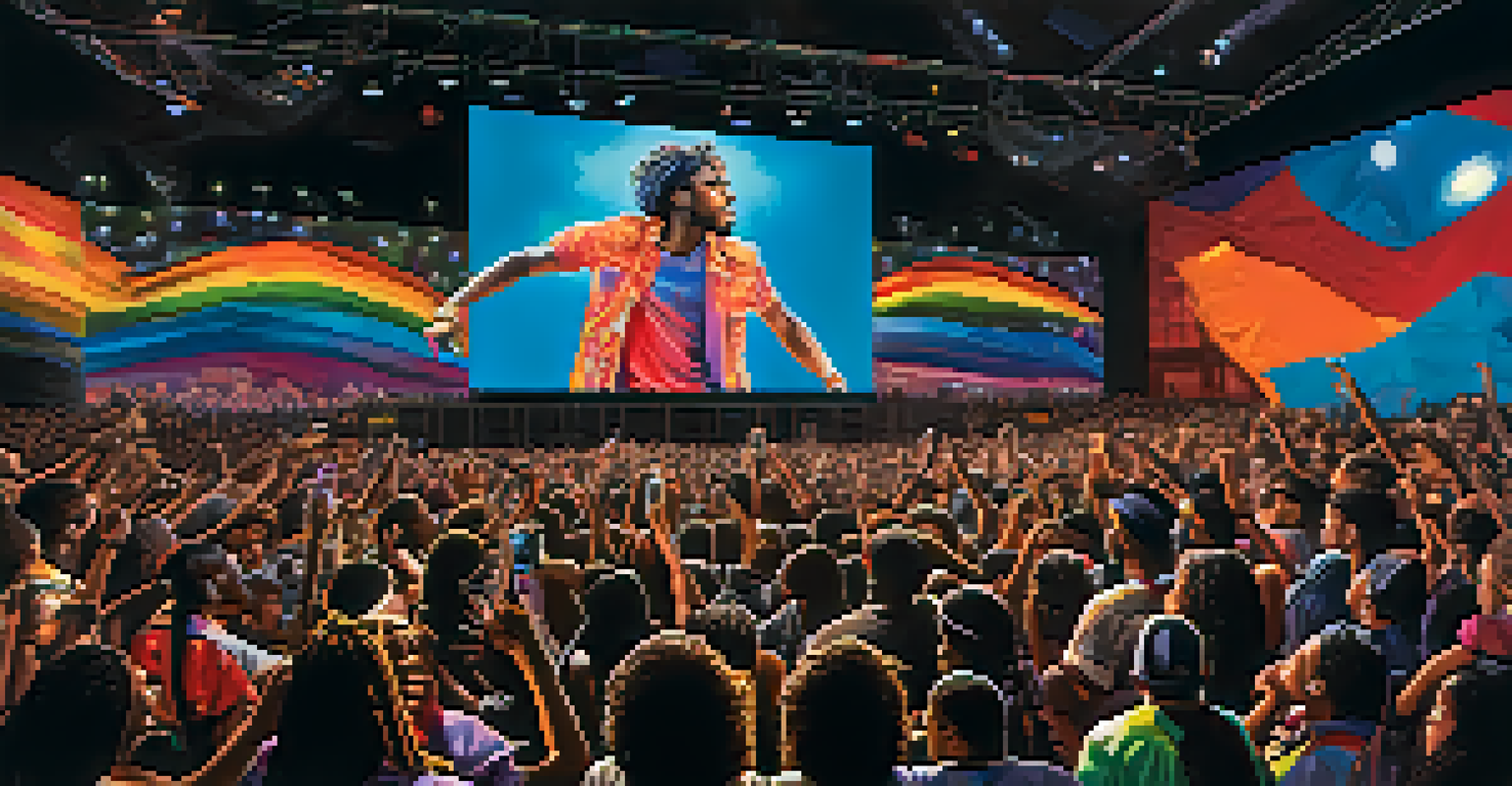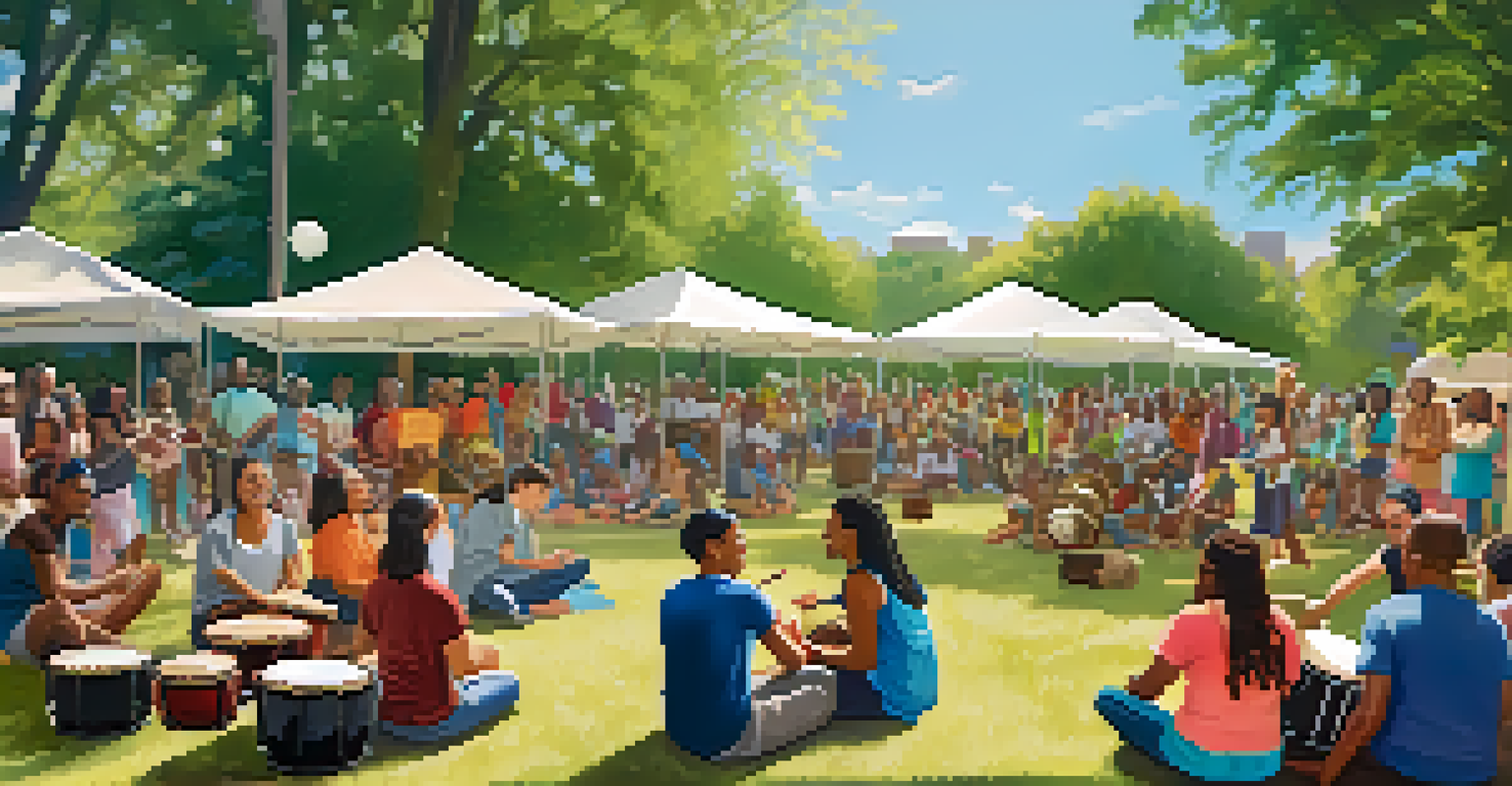The Role of Music in Enhancing Civic Engagement and Activism

Music as a Tool for Mobilizing Communities
Music has long served as a powerful medium for rallying communities together. From protest songs that echo the struggles of marginalized groups to uplifting anthems that inspire collective action, music creates a shared emotional experience. When people come together to sing or listen, it fosters a sense of unity and belonging, essential for effective civic engagement.
Music can change the world because it can change people.
Think about iconic songs like 'We Shall Overcome' during the Civil Rights Movement. This anthem not only brought people together but also conveyed hope and resilience in the face of adversity. Such musical moments become touchstones for collective memory, reminding individuals of their shared goals and struggles in the pursuit of justice.
Moreover, music transcends barriers, making it an effective tool for reaching diverse audiences. Whether through local concerts or viral online campaigns, music's universal language can inspire action and solidarity, making it a vital asset in the realm of activism.
The Emotional Connection of Music in Activism
One of the unique aspects of music is its ability to elicit strong emotional responses. This emotional connection can motivate individuals to engage in civic activities, from protests to community service. When people hear music that resonates with their values or experiences, it can ignite a passion for change that words alone may fail to achieve.

For instance, artists like Billie Eilish and Kendrick Lamar have used their platforms to address social issues through their music. Their powerful lyrics resonate with listeners, prompting them to reflect on societal injustices and consider their roles in enacting change. This emotional resonance can turn passive listeners into active participants in their communities.
Music Unites for Social Change
Music serves as a powerful medium to rally communities, creating shared emotional experiences that inspire collective action.
Furthermore, music can serve as a form of catharsis, helping individuals process their feelings about social issues. By channeling emotions through music, people often find the courage to take action, whether it's advocating for policy change or simply raising awareness.
Creating Awareness Through Musical Campaigns
Musical campaigns have become a popular way to raise awareness about social and political issues. By combining music with activism, artists can draw attention to important causes and encourage people to take action. For example, benefit concerts not only entertain but also educate audiences about pressing issues like climate change or human rights violations.
The power of music makes all the difference in the world.
Take the 'One Love Manchester' concert, which raised funds and awareness following the tragic Manchester Arena attack. The event brought together artists and fans to support victims and promote unity in the face of hate. Such initiatives demonstrate how music can be a vehicle for change, amplifying voices that might otherwise go unheard.
Furthermore, social media has transformed how musical campaigns reach audiences. With platforms like Instagram and TikTok, artists can share their messages widely, engaging younger generations in activism through catchy tunes that resonate with their values and experiences.
Music and Cultural Identity in Activism
Music often plays a crucial role in expressing cultural identity, which can be a powerful motivator for civic engagement. Many social movements draw on traditional music styles that resonate with cultural heritage, reinforcing a sense of pride and purpose among participants. This connection can galvanize communities to stand up for their rights and advocate for change.
For example, the use of reggae music in the Rastafari movement highlights how cultural expressions can fuel activism. The genre's themes of resistance and empowerment resonate deeply with listeners, encouraging them to embrace their identity while fighting against oppression. Such cultural connections can be incredibly motivating in a movement's quest for justice.
Emotional Resonance Drives Activism
The emotional connection of music motivates individuals to engage in civic activities, turning passive listeners into active participants.
Moreover, cultural music festivals often serve as platforms for activism, allowing artists to showcase their heritage while addressing social issues. These events create spaces for dialogue and solidarity, reinforcing the idea that music can be a catalyst for change rooted in cultural identity.
The Power of Lyrics in Shaping Public Opinion
Lyrics have a unique ability to shape public opinion and provoke thought. When artists craft songs that address societal issues, they can influence listeners' perspectives and inspire conversations about important topics. This lyrical engagement can lead to increased awareness and, ultimately, action on civic matters.
Consider the impact of songs like 'Fight the Power' by Public Enemy, which tackled systemic racism and injustice. The powerful lyrics resonate with listeners, prompting them to reflect on their own beliefs and actions. Such songs often serve as rallying cries, encouraging people to challenge the status quo and advocate for change.
Additionally, social media allows lyrics to be shared widely, amplifying their impact. When a song goes viral for its poignant message, it can spark movements and mobilize support for various causes, demonstrating the profound influence of music on public consciousness.
Collaborations that Amplify Activism
Collaborative projects between artists often amplify messages of activism, showcasing a united front for social change. When musicians from diverse backgrounds come together, their collective voices can create a powerful impact, drawing attention to critical issues that might otherwise be overlooked. This unity encourages fans to engage in activism as well.
For instance, the song 'Imagine' by John Lennon has been covered by countless artists, each bringing their unique style while promoting a message of peace and unity. These collaborations highlight the shared values of artists, inspiring listeners to join the fight for a better world. Such communal efforts remind us that activism can flourish when diverse voices come together.
Collaborative Efforts Amplify Messages
Collaborations between artists enhance activism, showcasing a united front that draws attention to critical social issues.
Moreover, when established artists collaborate with emerging talent, they can bridge generational gaps, fostering a wider audience for social messages. This mentorship not only elevates new artists but also reinforces the importance of coming together in the pursuit of social justice.
The Future of Music in Civic Engagement
As we look toward the future, the role of music in civic engagement and activism continues to evolve. With technology advancing rapidly, musicians now have more tools than ever to connect with audiences and inspire action. This evolution opens up new avenues for artists to engage with social issues and mobilize support.
Emerging platforms like live streaming and virtual concerts allow artists to reach global audiences, transcending geographical boundaries. This shift has the potential to create a more interconnected activist community, where messages of change can spread rapidly and resonate with diverse populations.

Additionally, as younger generations increasingly value social responsibility, music will likely play a central role in shaping their activism. With the right blend of creativity and purpose, artists can continue to inspire civic engagement, fostering a culture where music and activism go hand in hand.